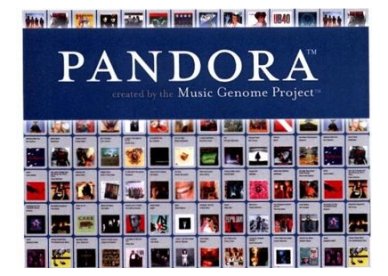| A Conversation with Tim Westergren from Pandora Internet Radio | You are viewing Page 2 of 2 -- Go to page 1 , 2 |
The Business of Music

But internet radio isn't just about getting music to listeners. It's easy to lose sight of the fact that it's still a business. As a survivor of the late 90's internet bubble Westergren is intimately familiar with the importance of providing a product instead of just interesting ideas.
To Pay or Not To Pay
Pandora initially started out as a subscription service for just $3 a month - an amount that would certainly fit into most people's budgets. As it turns out the problem isn't one of charging too much. It's convincing people to pay at all.
"Zero to anything north of zero is the big jump" he told me. And that's why Pandora is advertiser supported instead.
His focus on the business aspect of company's operation was obvious as he took questions from the group of Pandora users gathered to hear him speak earlier in the evening. At one point he asked how many people would be willing to pay a small fee for a particular feature. Not surprisingly few hands were raised.
The other big issue affecting Pandora's financial future is the royalties they have to pay. On one hand the language in the DMCA which defines how royalties are set and collected has made it easier for smaller labels and even artists without labels to collect money from webcasters.

Thanks to the single clearinghouse of SoundExchange Pandora is able to include recordings from artists from completely outside the label system. And they receive CDs from these artists in the mail daily.
The Great Royalty Debate
On the other hand the authority of the Copyright Royalty Board (CRB) to set royalty rates seems to highlight the lack of relevant expertise among government officials. Their decision last March to give the labels literally everything they asked for in a proposal that was clearly intended as a negotiating position rather than a line in the sand surprised people on both sides of the negotiating table.

The deal would not only force webcasters to pay additional royalties going back to the beginning of 2006, but also increase them over time to an estimated 60% - 70% of total revenue.
"It winds up topping out just shy of 3 cents and hour and most economists say that internet radio at its maximum efficiency does about a nickel an hour. Westergren said. "Which by the way is not that much less than terrestrial. It's not like they're holding internet radio to some feeble standard. Broadcast is about 7 cents an hour and they have the advantage of a monopoly."
The decision was a surprise to everyone involved. The labels' proposal asked for much more than they were expecting to get. But rather than create their own ruling balancing webcaster and label suggestions with common sense they simply picked one and approved it without modification.
He told me "The way they viewed is you had to do one or the other," adding "That one CRB decision has wreaked such havoc."
The havoc he was referring to is the uphill battle webcasters have fought for more than a year and a half to force SoundExchange, acting primarily on behalf of the major labels, to negotiate royalties that won't instantly put every internet radio provider out of business.
A Deal on the Horizon
After the passage of the Webcaster Settlement Act of 2008 Westergren believes the two sides are close to an agreement. Passed in September, it delays the date the new royalties will go into affect, allowing negotiations to continue two more months. The new deadline is February 15, 2009.
But for all its flaws, the DMCA's relatively simple approach to licensing is what makes Pandora's entire operation possible. The lack of such licensing in other countries has made it necessary to block people from those countries from using the service. Tim doesn't see any change in sight for that right now.
But if you happen to be in the US and you're also a music lover you can check out the Pandora website to try their internet radio service for yourself.
| A Conversation with Tim Westergren from Pandora Internet Radio | You are viewing Page 2 of 2 -- Go to page 1 , 2 |
Rich Fiscus October 16, 2008
previousIntrouction
Written by: Rich Fiscus

